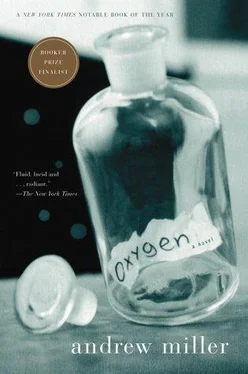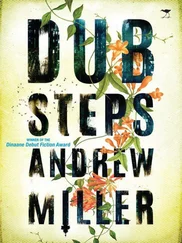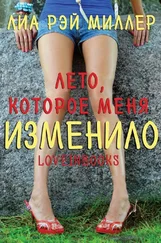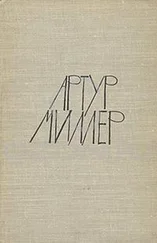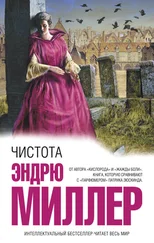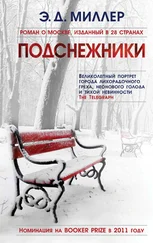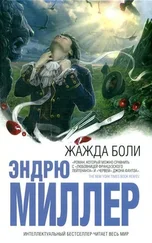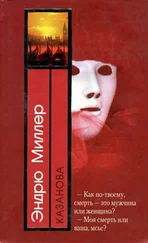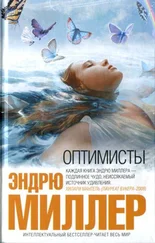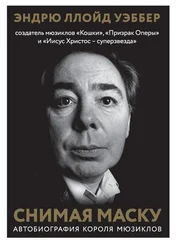Evenings at the theatre. Nights on the town. Weekends in the country. Do you remember? A history with very few of the pages glued together, though each time they played the game, each occasion inspired by some unvoiced disquiet, the recollections were reworked a little as the line between memory and imagination became subtler, or just unimportant. It nearly always worked, and if not, well, there was the sambuca to make up the difference. This, thought László, was entirely the point of such drinks.
It was ten-thirty by the time he let his eyes open to the daylight. Kurt was long since up, the duvet on his side thrown back as if he had leaped from the bed. László slouched to the bathroom. He felt excited and slightly ill, his cock half erect, a persistent buzzing in his left ear, a taste of alcohol and fire on his tongue. He stood under the shower and coughed for a while, trying to clear his lungs, then shaved, catching the scrawn of his throat and emerging into the kitchen thirty minutes later with three scraps of toilet paper stuck to his skin by the adhesion of his own blood.
Leaning by the stove he ate a croissant beurre , a painkiller, a vitamin pill, then dressed himself in grey slacks and a linen shirt and went down into the street feeling like a Hemingway character, some old boxer ennobled by weakness, hauling himself into the ring for a last big fight. The day was for settling things, and it was in this spirit he intended to have his talk with Franklin Wylie, though quite what he could say to him that would be of any use he was not at all sure. Something to shame, something to encourage. It was impossible, or at least unacceptable, that all their years of friendship should end in silence, a dull glare of mutual incomprehension.
He caught the Metro from Montparnasse Bienvenue, changed at Sebastapol and arrived at Parmentier shortly before noon. At the greengrocer’s on the corner of Rue Jacquard he bought a large bag of cherries, then walked to the rue du Deguerry and tapped in the code to the outer door, but as he crossed the vestibule to the stairs, Madame Barbossa spied him from her office and flagged him down. She had met him on many occasions, knew he was ‘like family’ with the Wylies, and revered him as a man of culture whose name might be found in the newspapers from time to time, though she had no practical idea of what he did. She told him that Monsieur Wylie had gone out early, eight o’clock, just as she herself was coming in. Madame Wylie had left two hours later to have lunch with her mother at the old folks’ place in Epinay.
‘I should have called,’ said László, though he was surprised; it was almost always safe to assume Franklin would be at home at this time of the day, working or mooching, sleeping even. He offered the gardienne a cherry. She was looking at him as if he might, handled in the right way, reveal some item of scandal, something she could add to her collection of Wylie stories. Something to amaze a neighbour.
‘The spare key?’ asked László. He was not averse to a little gossip, but this was not the occasion for it. ‘I’ll put the cherries in the fridge so they can be enjoyed cold.’
‘As you like, monsieur.’
She fetched the key from her office. László wheezed his way to the fourth floor and let himself in. It was an old apartment, and little had been altered since the Wylies had bought it in ’78 or ’79, choosing it for its high ceilings, the pretty church across the street, the flood of the evening sun. The walls in the hallway formed a little gallery, densely hung. There were things by Franklin there, but most of the pictures were the work of dead friends, including a Phillip Guston, and even a Beuys sketch of what looked like a severed head, Orpheus perhaps, ‘his gory visage’ floating down the Hebrus.
He moved into the kitchen, where pans and skillets hung in rows from butcher’s hooks. It was the scene of many fine suppers together in the past. Laurence was a first-class cook; she was also a tidy woman, even a meticulous one, for whom the kitchen was a serious space, a place to be respected, so it was surprising and unnerving to see in the middle of the room a bottle of red wine left where it had fallen or been dropped or, God knows, thrown. A starburst of glass, the wine pooled in the hollows of the tiles and spattered on to skirting boards and cupboards. The record of an impact, very exact.
He tiptoed around the debris and placed the cherries on a shelf in the fridge, then looked beneath the sink for some newspapers to clean up with, and was crouched there reading the front page of an April edition of Libération when he heard what sounded like the soft opening or shutting of a door somewhere in the body of the apartment. He stepped into the passage.
‘Franklin?’
Not even Madame Barbossa’s vigilance was perfect. Franklin might have returned long ago, slipping past her while she admired someone’s dog or baby. When he wished to he could move very quietly, a tall ghost, padding up behind people, startling them with a sudden tap on the shoulder.
László moved along the corridor to the studio, the largest room in the apartment, with big windows overlooking the church, and a door at the far end leading into a small washroom.
‘Franklin?’
Along the length of the wall opposite the windows was a long table – an old dining table – its surface covered with a guano of slopped and dried paint. Brushes and palette knives stood to attention in a score of tins. Above the table, the shelves were loaded with coiled aluminium paint tubes, aerosol cans and plastic bottles of pigment, fabulous colours that would have exhausted László’s vocabulary had he attempted to name them all. And there were tools for gouging and scraping, boxes of charcoal, print rollers, a staple gun, all the paraphernalia of the artist, which writers, condemned to pen, keyboard and ashtray, feel such envy of. But there was nothing on the easels or pinned to the walls, not even a sketch, though on the floor there were half a dozen large canvases stood up with their backs to the room, as though in disgrace. No scattering of rags, no endearing mess, nothing to suggest the sanity of work. The place looked to have been finished with, abandoned. László could remember a time when there had always been flowers there – fistfuls of them in jars of discoloured water.
He lifted the outermost canvas on to the pegs of an easel, and stepped back. Though the greater part of Franklin’s output had always been abstract, large-scale, incensed with colour, the painting on the easel was figurative in the style of the German expressionists – Kokoschka, perhaps, or Barlach – and depicted a newly married couple on the steps of the mairie. The bride, in her costume of rose blooms, was immediately recognizable as Laurence Wylie. Not the young Laurence (a woman centred in her smile, in the warmth of her regard), but Laurence as she was now, Laurence the martyr, the victim, the dupe. It was grievous to see, but such was the quality of Franklin’s attention to her, the scrupulous depiction of an unhappiness he himself had authored, that László felt his throat constrict and his eyes become moist. Confronted with such a face, with the perverse love that had laboured over its depiction, blame or anger was beside the point. Useless.
He turned from the woman to the figure at her side. A man in a black suit, his head tightly wrapped in what appeared to be cellophane, or that plastic film used to preserve food, so that his features were flattened and distorted like a bank robber’s in a stocking mask. His back was arched in the agony of a suffocation, his fists bunched in rage, but his bride, oblivious to his torment, or just helpless to relieve it, ignored him, and looks directly forward, engaging the gaze of the viewer as if searching for some deliverance beyond the frame, though there was something else in her expression, some mute communication painted into the eyes like a code, that László could not immediately make sense of. He had to stand farther back – two, three steps – before he saw that it was a look of warning.
Читать дальше
